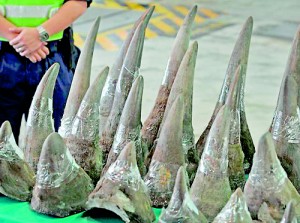Sunday Times 2
Is loss of wildlife to be blamed for rise in organised crime?
Violent conflicts, organised crime and child labour are being driven by declines in wildlife population.
This is according to a recent report which highlights how losses of food and employment from wildlife are creating political instability.
The research also suggests that falling animal populations could be connected to an increase in human trafficking as criminal groups rely on slave labour, often children, to meet the need for increased manpower.
‘This paper is about recognising wildlife decline as a source of social conflict rather than a symptom,’ said Justin Brashares, professor of ecology at University of California, Berkeley, who led the study.

The study compared wildlife poaching to the drug trade, suggesting that huge profits from trafficking luxury wildlife goods, such as elephant tusks and rhino horns (pictured) have attracted guerilla groups and crime syndicates worldwide (AFP)
‘Billions of people rely directly and indirectly on wild sources of meat for income and sustenance, and this resource is declining. ‘It’s not surprising that the loss of this critical piece of human livelihoods has huge social consequences.ns.’
Fewer animals to hunt and less fish to catch generate increasingly greater effort to harvest, the report said.
Labourers – many of whom are children – are often sold to fishing boats and forced to work 18-20 hour days at sea for years without pay, it said.
‘Impoverished families are relying upon these resources for their livelihoods, so we can’t apply economic models that prescribe increases in prices or reduced demand as supplies become scarce,’ said Professor Brashares.
‘Instead, as more labour is needed to capture scarce wild animals and fish, hunters and fishers use children as a source of cheap labour. ‘Hundreds of thousands of impoverished families are selling their kids to work in harsh conditions.’ The authors connected the rise of piracy and maritime violence in Somalia to battles over fishing rights.
What began as an effort to repel foreign vessels illegally trawling through Somali waters escalated into hijacking fishing – and then non-fishing – vessels for ransom.
‘Surprisingly few people recognise that competition for fish stocks led to the birth of Somali piracy,’ said Professor Brashares.
‘For Somali fishermen, and for hundreds of millions of others, fish and wildlife were their only source of livelihood, so when that was threatened by international fishing fleets, drastic measures were taken.’
The study also compared wildlife poaching to the drug trade, suggesting that huge profits from trafficking luxury wildlife goods, such as elephant tusks and rhino horns, have attracted guerilla groups and crime syndicates worldwide.
They pointed to the Lord’s Resistance Army, al-Shabab and Boko Haram as groups known to use wildlife poaching to fund terrorist attacks.
‘The most important bit from this article, I think, is that we need to better understand the factors that underlie fish and wildlife declines from a local perspective, and that interdisciplinary approaches are likely the best option for facilitating this understanding,’ said Meredith Gore, a Michigan State University associate professor of conservation criminology who was not part of the study.
The authors give examples of local governments heading off social tension, such as the granting of exclusive rights to hunting and fishing grounds to locals in Fiji, and the control of management zones in Namibia to reduce poaching and improve the livelihoods of local populations.
‘This prescribed re-visioning of why we should conserve wildlife helps make clearer what the stakes are in this game,’ said UC Santa Barbara assistant professor Douglas McCauley.
‘Losses of wildlife essentially pull the rug out from underneath societies that depend on these resources. We are not just losing species.
‘We are losing children, breaking apart communities, and fostering crime. This makes wildlife conservation a more important job than it ever has been.’
© Daily Mail, London

